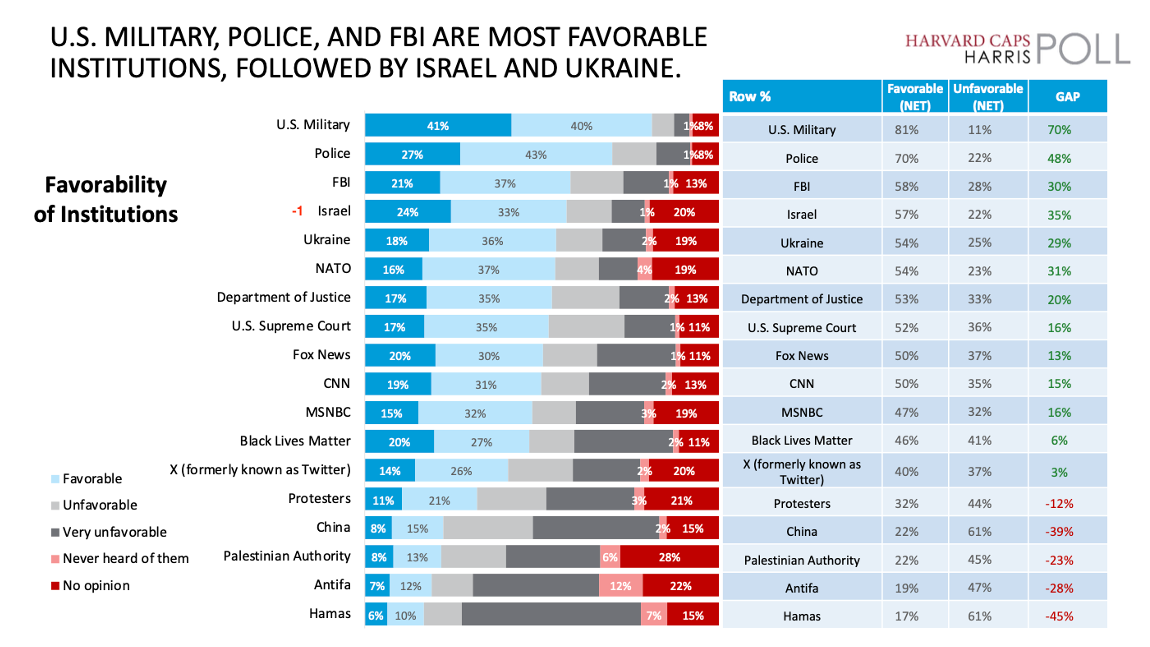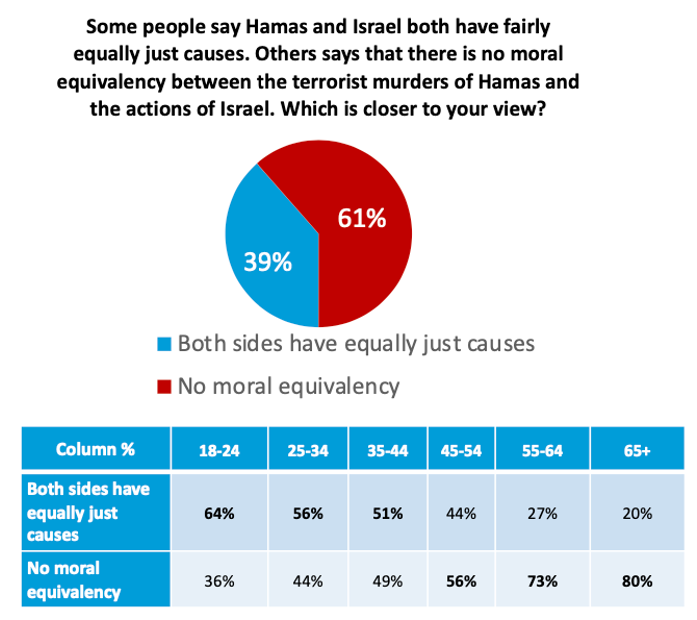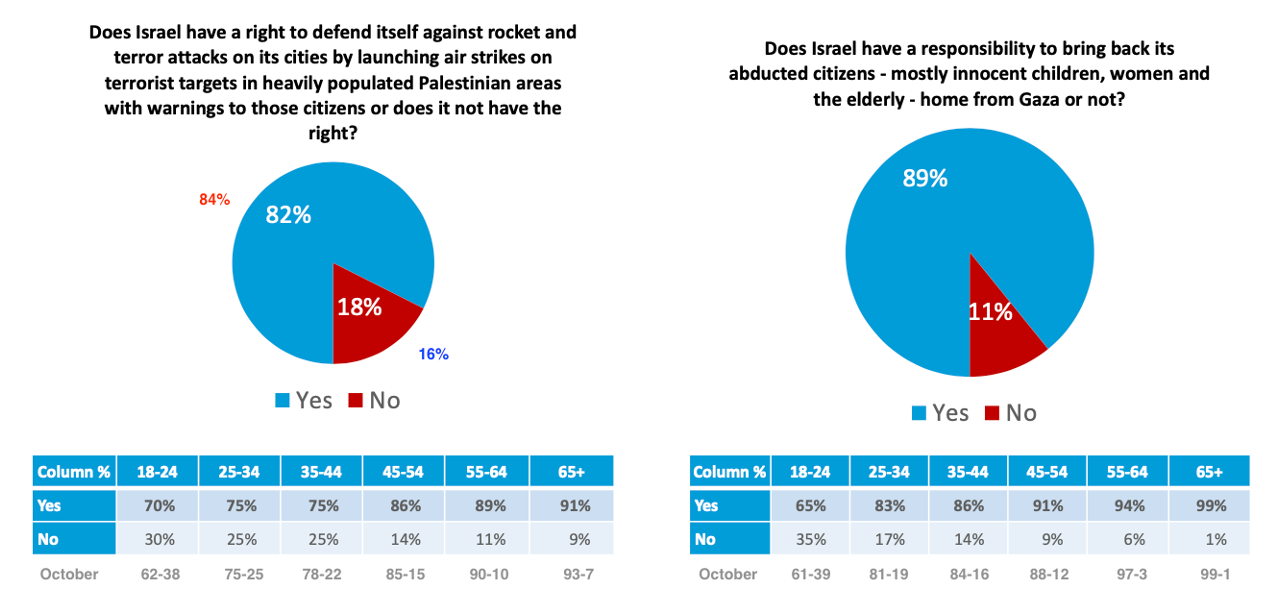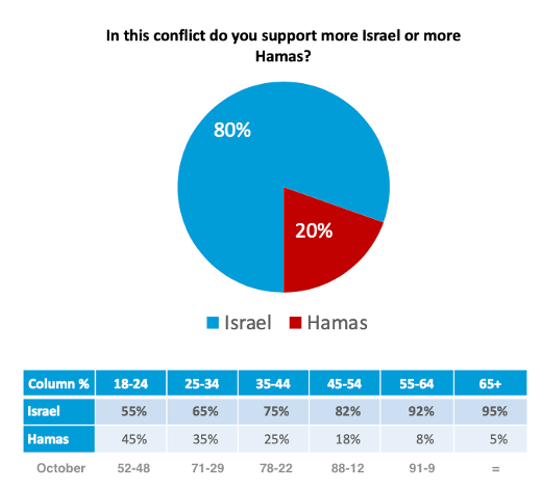The Israel Paradox: There's Good News and Bad News
"The journey ahead demands a profound re-evaluation and analysis of the emotional currents shaping the perceptions of Israel in the hearts and minds of the next generation of Americans."
By Joanna Landau
As someone who has been involved in promoting Israel’s image to the world for the last 15 years, and having closely followed opinion polls about Israel long before October 7, 2023 (and now more closely than ever), I can confirm unequivocally: Israel’s current global image is far better than most of us feel or think. Far, far better.
Considering the ground incursion by our forces into Gaza several days after the horrible acts of October 7, you would expect sympathies towards Israel to have fallen greatly since then. Certainly judging by the many anti-Israel opinion pieces shared by people we used to respect, the skewed media headlines or a brief scroll through our social media feeds.
Yet the polls tell us something very different: overall, Americans tend to feel far more sympathy for Israel than for the Palestinians. Always did. And now they feel it more. I know it may be hard to believe, but take a look at YouGov polls in the U.S. since 2015 and see for yourself:
In other words, in the short term, we’re doing fine. That’s the good news.
Long-term, however, is a whole other story, due to the generational divide. In mid-October, the Jewish community and government of Israel were both heartened and shocked at the same time by the Harvard CAPS / Harris pollresults on the issues relating to the Israel-Hamas War: heartened because sentiments mostly favored Israel, which echoed every other poll on sympathies towards Israel and the Palestinians. At the same time, we were all shocked to discover that young Americans held very different perceptions of the situation than expected, considering the gravity of Hamas’ brutal attacks on innocent civilians that took place on October 7.
The center has now released an update to that study (both studies represent a nationally representative sample of over 2,000 registered American voters). In the tumultuous waters of American public opinion, the November update of the nation’s perceptions of the Israel-Hamas conflict reveals a complex landscape, where generational tides ebb and flow. Here are some findings from the November results, that shed light on the Israel Paradox.
Israel: Still Riding High in American Favor
Despite the seismic events in Gaza just six weeks prior, which have led to over 12,000 Palestinians dead, Israel remains firmly ensconced as one of America’s top four most favorable institutions, preceded only by the US military, the Police and the FBI. This is a rather surprising result, considering the long list of options respondents were presented with, which included various USA government agencies, international media platforms, other countries, social movements such as #BlackLivesMatter and more. The fact that Israel outshines even Ukraine in the eyes of Americans is a testament to the resilience of its image, even during these trying times. In the October poll Israel ranked even one point higher.
Equally unexpected for some (but not a huge twist for others who recognize that Americans likely have bigger fish to fry than concern themselves with what’s going on in the Middle East), the Israel-Hamas conflict doesn’t loom as large in the American psyche as one might think. While we, as stakeholders in this geopolitical chess match, fret over perceptions, the majority of Americans place at least nine other issuesabove the fray. It’s a silver lining, suggesting that our concerns may not be the national preoccupation we sometimes fear.
Biden’s Israel Policies: Almost 60% of Americans Approve
Optimism should prevail when it comes to Americans’ approval of Biden’s Israel policies, even though it may not feel like it. The majority of voters (even younger ones) nod in approval, signaling a relatively united front in favor of supporting Israel and dispatching aid packages. The current stance of the Biden administration is crucial for Israel’s strategy against Hamas, underscoring the strategic importance of maintaining this support.
Generational Shifts: The Bad News
A deeper dive into generational perspectives, however, reveals a disconcerting trend. The ground incursion in Gaza has etched a generational divide, amplifying concerns about the future. While the overall picture seems almost rosy, all things considered, the shifts in younger demographics suggest a need for strategic recalibration. Here are three data points worthy of consideration:
Moral Equivalence: A Perplexing Conundrum: The question of moral equivalence between Hamas and Israel’s grievances is a mystifying puzzle. While the majority perceives no moral equivalence, a significant portion of younger generations harbors a different view, with over two thirds of young Americans viewing Hamas’ and Israel’s grievances as equally justified. Israel’s failure to garner unequivocal support amongst Gen Z and millennial audiences (up to the age of 44), is disconcerting, not to say downright scary, given Hamas’s designation as a terrorist organization by the international community and the plethora of visuals from October 7 that confirm its heinous acts. Note that the question did not ask about Palestinian vs. Israeli causes, but Hamas vs. Israeli causes.
The Two-State Solution: A Divided Landscape: The call for a two-state solution echoes through the corridors of American opinion (60% opting for that choice over Arab states absorbing the Palestinians, or ending Israel altogether), but the resonance varies across generations. Younger demographics exhibit a hesitancy, with a noteworthy percentage contemplating alternatives, including a surprising openness to the idea of ending Israel (17%, which at least is down 9 points from the October study).
(The numbers in blue and red are the percentages from the October poll, with blue indicating that the numbers have increased, and red indicating a decrease since October)
Dissonance Between Intellect and Emotion: A glaring dissonance emerges between intellectual understanding and emotional responses, particularly among the younger populace. Despite recognizing Israel’s right to defend itself and its responsibility to bring back hostages, emotional sympathies of the younger respondents still lean far too heavily toward Hamas, with 45% of 18-24 year-olds supporting Hamas over Israel! This emotional battleground presents a unique challenge that demands innovative solutions that tap into the psyche rather than intellect.
Charting the Course Forward: A Call for Disruptive Thinking
As we navigate the currents of American public opinion, it is evident that short-term strategies are yielding results, but a long-term approach requires disruptive thinking. The generational schism cannot be bridged through conventional means; instead, a new narrative about Israel, one that resonates emotionally with the Next Gen and is deemed relevant and attractive by them, must be crafted.
A word to the wise, though: placing all of one’s energy and resources in trying to “fix” this generational divide right now, while the war is going on, is an unrealistic strategy. For the best part of the last decade, Israel and the entire Jewish community have been bemoaning the gradual disconnect between the Jewish homeland and the Next Gen, even some Jewish Next Gen. There is nothing new here. What is new is that now we know that whatever the Jewish community and Government of Israel tried to do before October 7 to turn the tide, did not work. It’s a truth that we all must face, accept and learn from.
The journey ahead demands a profound re-evaluation and analysis of the emotional currents shaping the perceptions of Israel in the hearts and minds of the next generation of Americans. It also demands a degree of patience and delaying of gratification: while we are at war, we must not forget the “Silent Majority” above the age of 45 that has a greater tendency to support Israel. While not ignoring the Zoomers and millennials altogether, it’s the Gen X’ers and Baby Boomers who can truly help us win this war and bring our hostages back. They are the audience we should really be focusing on right now.
In conclusion, while the overall perception of Israel in America appears favorable, the generational undercurrents paint a different story. While we continue to defend Israel’s legitimacy in the short-term, the need for a long-term recalibrated communication strategy, one that acknowledges the emotional landscape of the youth, becomes imperative.
* For more analyses of polls, strategic advice on how to effectively advocate for Israel, recommendations of talking points and reviews of social media trends, please visit the Hasbara Toolbox.
Joanna Landau is the bestselling coauthor of Ethical Tribing, Founder & President of Vibe Israel (harnessing the power of digital influencers to promote Israel to the world) and a Contributor at The Times of Israel.
Free subscriptions to JEWDICIOUS are available until the end of 2023!
From unpacking history and politics to navigating the nuances of family and personal relationships to finding the human angle on sports and entertainment — plus our unsparing take on what’s happening in the Jewish world — the canvas at JEWDICIOUS is limitless! JOIN US!!












My concern with our younger population is that they are not clearly seeing the difference between the Hamas terrorist organization and “the poor, innocent Palestinians”. They do not realize that in today’s situation, pro Palestinian is pro Hamas.
I appreciated this informative article. Current overall American sentiment is both a comfort and surprise. Work to be done with the younger generation to be sure. No surprise there.